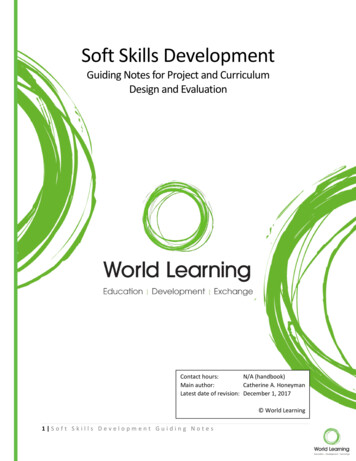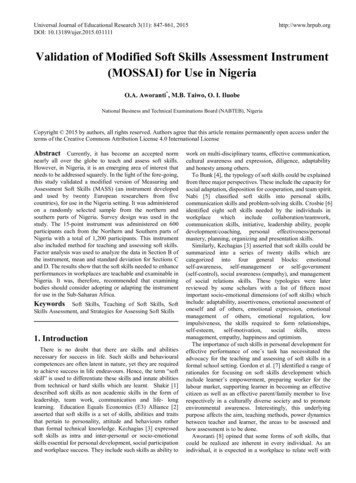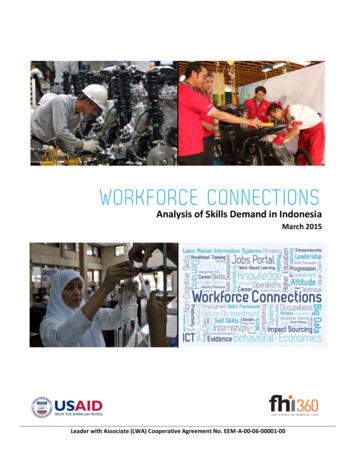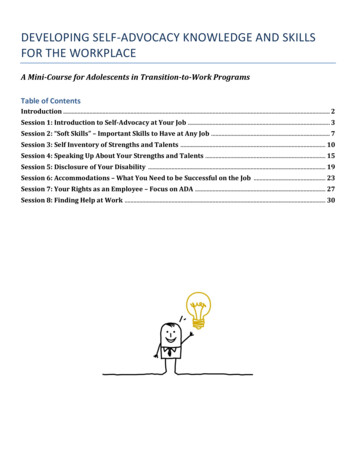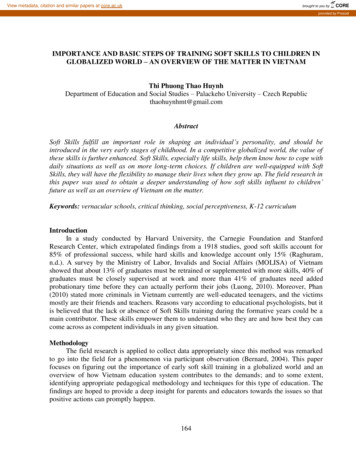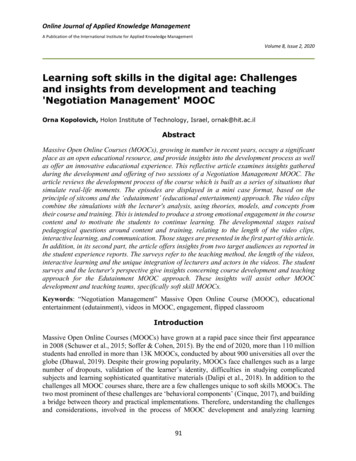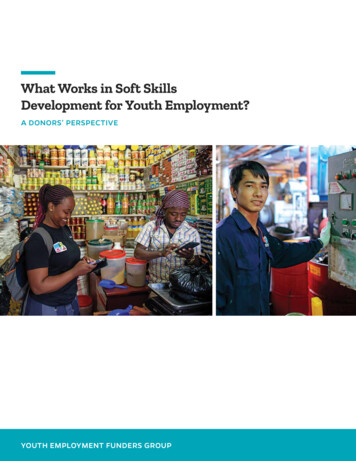
Transcription
What Works in Soft SkillsDevelopment for Youth Employment?A DONORS’ PERSPECTIVEYOUTH EMPLOYMENT FUNDERS GROUP
AcknowledgementsThis report was prepared by Clare Ignatowski, and commissioned andedited by the Youth Employment Funders Group (YEFG) in partnershipwith the Mastercard Foundation.A wide range of stakeholders and YEFG members, including experts fromthe Australian Department of Foreign Afairs and Trade, Citi Foundation,the Department for International Development, JPMorgan Chase, andthe World Bank, were consulted during the development of the report.Draft versions of the report were discussed through Youth EmploymentFunders Group webinars and at various events, including at the BrookingsInstitution in conjunction with the Center for Universal Education’s AnnualResearch and Policy Symposium, the Building Evidence in Education (BE2)2017 annual meeting and the Comparative and International EducationSociety (CIES) 2017 conference.YEFG Steering CommitteeWhat Works in Soft Skills Development for Youth Employment? A Donors’ Perspective 1
Executive SummaryProfound global changes in the use of technology and the nature of workhave urgent implications for how we educate young people and preparethem for the labour market. Employers are increasingly looking foryouth who are fexible, adaptable, proactive, creative and collaborative.In short, youth need soft skills: the broad set of skills, attitudes, behavioursand personal qualities that enable them to efectively navigate theirenvironment, work with others, perform well and achieve their goals.There is a growing awareness of the value of soft skills to both employeeproductivity and the healthy development of young people in general.The development of soft skills is deeply intertwined with academic andtechnical skill development. Though soft skills are increasingly seen tobeneft youth in all domains of life, these skills are poorly understood,not well assessed, and too often overlooked in policy and institutionalcontexts, including education, training and the workplace.This report summarizes areas of consensus regarding soft skills from theperspective of the Youth Employment Funders Group (YEFG), a network ofdonors working together to generate and share more and better evidencebased knowledge on what works in the feld of youth employment. Thedocument provides a common understanding for policymakers, employers,donors, and civil society organizations, identifes implementation andevaluation challenges, and suggests directions for investment in costefective, scalable and sustainable interventions and knowledge.A young worker checks fnal products at a garment factory in Hung Yen Province.ILO in Asia and the Pacifc. ILO/Nguyê n Viê.t Thanh2 What Works in Soft Skills Development for Youth Employment? A Donors’ Perspective
Summary of Recommendations1. Build Coherence Around Soft Skills Focus on core skills while taking a holistic view. Harmonize terminology.2. Deepen Reform Eforts Support mindset change across the system.Foster soft skills systems within governments.Expand soft skills in formal education.Support youth in active learning and leadership roles.3. Catalyze Essential Partnerships Create education and training partnerships with businesses. Scale demand-driven models. Develop linkages between civil society organizations andformal education institutions.4. Improve Program Quality Ensure learning environments are structured to build soft skills. Support the preparation of teachers and youth workers. Foster entrepreneurial thinking.5. Enhance Assessment and Evaluation Build better, more consistent soft skills assessment measures. Evaluate for effectiveness, including cost-effectiveness,in order to scale. Pay equal attention to institutional culture and practices.What Works in Soft Skills Development for Youth Employment? A Donors’ Perspective 3
IntroductionThe Sustainable Development Goals are auniversal call to action to end poverty, protectthe planet and ensure that all people enjoy peaceand prosperity.Sustainable Development Goal 8 aims to “promotesustained, inclusive and sustainable economicgrowth, full and productive employment anddecent work for all.” The targets establish that“for all” includes young people, as well as bothwomen and men, and persons with disabilities.The targets also include a reduction in theproportion of youth not in employment, educationor training, and the operationalization of a globalstrategy for youth employment. They also speakto “promoting development-oriented policies thatsupport productive activities, decent job creation,entrepreneurship, creativity and innovation, andencourage the formalization and growth of micro-,small- and medium-sized enterprises, includingthrough access to financial services,” all of whichwill also support youth employment.Additionally, Goal 4 on education also has specificand explicit relevance to youth employment. Here,targets include a focus on access to affordableand quality technical and vocational education,and on increasing the number of youth withrelevant skills for employment, decent jobs andentrepreneurship.The Youth Employment Funders Group (YEFG) is anetwork of over twenty multilateral organizationsand international donors, including privatefoundations, working together to generate andshare more and better evidence-based knowledgeon what works in the field of youth employment.YEFG has been meeting since 2009, with asecretariat established in 2014 to support theGroup’s mission.The severity of global youth unemployment and working poverty has ralliedthe international community and drawn attention to the need for highquality, relevant youth skills development, as outlined in the SustainableDevelopment Goals. Globally, over 70 million youth are unemployed,and 156 million young workers are living in poverty.2 For young peopleto successfully contribute to the growth of emerging economies, theirskills need to be adaptable to both the changing nature of work and thevarious opportunities that become available to them. Achievement ofthe Sustainable Development Goals is contingent on the ability of youngpeople to efectively and successfully transition into the workforce andretain employment over time. Their ability to master soft skills is key tobeing able to successfully navigate the various pathways of work.There is a growing awareness that, combined with technical and academicachievement, soft skills are critical to young people’s success in theworkplace and their development in all domains of life. But soft skillsare poorly understood, not well assessed, and all too often overlookedin policy and institutional contexts, including education, training and theworkplace. By highlighting the importance of soft skills and seeking tomore deeply understand them, we can help ensure that all young peopleacquire these skills for employment and life success. Despite a proliferationof terms and frameworks for describing these skills, there is a remarkableconsensus around the types of skills youth need and the broad parametersregarding how to develop them. While much is still to be learned aboutwhich interventions work best for youth populations in specifc countrycontexts, a great deal is known about soft skills development principles,from felds as diverse as psychology, economics, business, educationand health.The Youth Employment Funders Group believes that the emergingevidence for soft skills acquisition justifes increased policy dialogue,investment, coherence and scaled programmatic implementation. Thisreport summarizes the areas of consensus on soft skills for policymakers,employers, educators, donors and civil society organizations. Thereport also identifes implementation and evaluation challenges, aswell as promising avenues for investment in cost-efective, scalableand sustainable interventions and in new knowledge to support theseinterventions.4 What Works in Soft Skills Development for Youth Employment? A Donors’ Perspective
How are soft skills defined?For the purpose of this report, soft skills are defned as the mix of skills,attitudes, behaviours, personal qualities and mindsets that individualsuse to be successful across diferent situations in work and life. Whilerecognizing that all terms come with strengths and challenges, YEFGprefers the term “soft skills,” especially when referring to workforcedevelopment and youth employment outcomes.Recent analysis leads us to propose that youth soft skills developmentshould focus on fve sets of skills: positive self-concept, self-control,communication, social skills and higher-order thinking (which includesproblem-solving, critical thinking and decision-making).3 A focus on theseskills for youth employment programming does not mean that they arethe only soft skills that matter for all young people everywhere, nor thatprograms should cease conducting assessments to determine the needsof particular target groups. Rather, a focus on these core skills ensuresthat all youth build the soft skills for which there is evidence of positiveemployment outcomes, and that there is greater coherence in the feld.See Annex 2 for further discussion on terminology.Why is it important to pay attention to softskills for youth?TODAY’S (AND TOMORROW’S) GLOBAL ECONOMY NEEDS SOFTSKILLS MORE THAN EVERSince the early 1990s, when the report What Work Requires of Schools wasissued to the US Department of Labor by the Secretary’s Commission onAchieving Necessary Skills,4 the skills gap has been an enduring focus ofanalysis. The skills gap refers to the degree of alignment or misalignmentbetween the skills youth develop through education and training, andthe skills needed by employers. As real as this misalignment is, there isalso a gap between skills needed today and those needed in the future,because the exact nature or rate of change of economic progress cannotbe predicted. As a result, educational institutions’ oferings tend to lagbehind the real economy.What Works in Soft Skills Development for Youth Employment? A Donors’ Perspective 5
“Already today, some 40 percent of employers globallyare finding it difficult to recruit people with theskills they need. The ability to acquire new skillsthroughout life, to adapt and to work flexibly will beat a premium, as will technical, social, and criticalthinking skills.”— The Education Commission,The Learning Generation (2016).Profound global changes in the use of technology and the nature of workhave urgent implications for how young people prepare for the labourmarket. Youth increasingly need to be fexible, adaptable, proactive,creative and collaborative. In short, they need soft skills to efectivelynavigate their environment, work with others, perform well and achievetheir goals. And, in recognition of the changing nature of work and theworkplace, employers increasingly demand soft skills to support theirenterprises and organizations. Where soft skills lead to better businessperformance, this can translate into economic growth.According to a recent World Economic Forum study, described in Figure 1,“more than one third (36%) of all jobs across all industries are expected to require complex problem-solving as one of their core skills, comparedto less than 1 in 20 jobs (4%) that will have a core requirement for physicalabilities such as physical strength or dexterity.”5 Furthermore, “ socialskills — such as persuasion, emotional intelligence and teaching others— will be in higher demand across industries than narrow technical skills,such as programming or equipment operation and control. Content skills(which include ICT literacy and active learning), cognitive abilities (suchas creativity and mathematical reasoning) and process skills (such asactive listening and critical thinking) will be a growing part of the coreskills requirements for many industries.”6 Non-routine work tasks areincreasing in proportion to routine work, requiring fexibility in thinkingand behaviour. Similarly, in the United States, between 1980 and 2012,the number of jobs requiring social skills grew by nearly 10 percent, whilethe number of math-intensive but less social jobs (including many STEMoccupations) shrank by about three percent.7Figure 1: Need for soft skills large and growing across industries.8 Change in demand for core work-related skills,2015-2020, all industries. Share of jobs requiring skills family as part of their core skills set, %.SCALE OF SKILLSDEMAND IN 2020Cognitive Abilities15%52%Systems Skills17%42%Complex Problem Solving36%40%Content Skills10%40%Process Skills18%39%Social Skills19%37%Resource Management Skills13%36%Technical Skills12%33%4%31%Physical Abilities0Source: Future of Jobs Survey, World Economic Forum20Growing Skills Demand4060Stable Skills Demand6 What Works in Soft Skills Development for Youth Employment? A Donors’ Perspective80100Declining Skills Demand
We do know, however, that there is exponential growth in data-productionrelated work and some technology-related work (e.g., 3D printing,nanotechnology, artifcial intelligence) that will likely mean that labourmarkets will experience disruptive change in how work is performed, aswell as the skills needed for success within it.Overall, the trend is toward increased need for complex problem-solvingand social skills.9 A recent World Bank analysis of 27 studies globallyreveals that while employers value all skill sets — basic cognitive, technical,advanced cognitive, and socio-emotional — they especially value the lattertwo skill sets by wide margins. The study notes that “these results arerobust across region, industry, occupation, and education level. Employersperceive that the greatest gaps are in socio-emotional and higher-ordercognitive skills.”10 Overall, there is a growing recognition among employersand educators that left-brain dominance such as technical know-howmust be complemented, and is in fact deeply interwoven, with rightbrain intelligence such as empathy, inventiveness, creativity, intrinsicmotivation and growth mindset.11For employers, building a consistent and measurable business case forinvestment in soft skills development is crucial. Having a workforce ofemployees who have mastered key soft skills reduces employer costs inrecruitment, training time and employee turnover, and improves employeeperformance on bottom-line business metrics, such as higher sales andbetter consumer service. An example from manufacturing is providedbelow in Figure 2.Figure 2: The link between soft skills, workplace behaviours and outcomes for the manufacturing sector.SOFT SKILLWORKPLACE BEHAVIOURSBUSINESS IMPACTSHigher-orderthinkingVision for performanceAnalyze problemsEfective trouble-shootingDecision-makingTrend toward improvingperformance & market shareSocial skillsSense potential conficts& act to preventCoordinate with work of othersImproved productionefciencyBetter worker retentionCommunicationCommunicate productionneeds to managersExplain processes to new workersReduce slowdownsStabilize workfowImprove reportingSelf-controlPunctuality & attendancePacing efortStable performance(time money)Source: Adapted from USAID (July 2016).12What Works in Soft Skills Development for Youth Employment? A Donors’ Perspective 7
There are now greater opportunities for youth employment serviceproviders and employers to work together to collect and analyze suchbusiness data and to use it for program development. Businesses mayalso agree to enter cost-share agreements or be willing to pay for servicesthat reliably produce marked skills improvements in youth, especially forentry-level jobs. More robust private-sector investment could alleviatesome of the resource limitations that have prevented scaling of youthemployment eforts to date.Although the global economy is increasingly undergoing disruptivetechnological change, the reality of work remains quite diferent for amajority of low-income youth across the developing world. In low- andmiddle-income countries, at least three out of four young workers areinformally employed. In the absence of sufcient waged employmentopportunities, the vast majority of young people “undertake a mix ofinformal sector employment, self-employment and agriculture-relatedactivities”14 in order to reduce risk and diversify opportunity. Livelihoodsare mixed concurrently and in succession, in the short term and over thecourse of a working life. Many young people also combine one or more jobsand income-generating activities with investments of time and resourcesin education or training in order to build knowledge and skills to grow theirbusiness or change their career. Soft skills can be useful for negotiatingthese multiple, sometimes unpredictable, livelihood options.15BRAIN DEVELOPMENT SCIENCE TELLS US THAT YOUTH IS A CRITICALPERIOD FOR SOFT SKILLS DEVELOPMENTPrinting house worker in Cambodia, ILO in Asia and the Pacifc. ILO/Wei Xiangnan.Policy interest in soft skills has also been infuenced by increasingscientifc understanding of youth development processes, includingthe development of the brain. Recent neuroscientifc research hasoverturned older beliefs that brain development was complete and setby early childhood.16 In fact, the brain changes and exhibits the ability toregenerate throughout life. The brain is malleable until at least the mid-tolate twenties, and key personality traits, such as conscientiousness, canshift in older age.17 In addition to early childhood, adolescence and youngadulthood together make up the second critical window of opportunity forgrowth and development. There is mounting evidence of this, including: Positive developmental experiences in early and middle childhoodare critical to optimal soft skills development in adolescence andyoung adulthood. Soft skills can be learned. Even personality traits, which are usuallythought to be stable, shift throughout life and are mediated byskills.18 For example, an introverted person can develop, and deployat will, the skills and behaviours that are usually associated with moreextroverted people.198 What Works in Soft Skills Development for Youth Employment? A Donors’ Perspective
A complex combination of genetics and experience shapes the brainon a continuous basis. Experience and lived reality at all levels —physical, social, emotional and cognitive — are what trim neuralcircuits for more efcient thought. During adolescence, the brain is still a work in progress. Adolescentsand young adults are in the process of developing executive function,which includes selective attention, long-term planning, prioritizing,calibrating risk and reward, and regulation of emotion. Adolescents and young adults tend to be highly sensitive to, andmotivated by, rewards in their social environment because of dynamicchanges in brain structure during this period. They often exhibit morerisk-taking behaviours as executive function is not fully developed.20 Young people who have experienced stress and trauma throughexposure to extreme poverty, deprivation, violence and confictearlier in life may experience greater challenges in developingexecutive functioning and self-regulation, i.e., managing emotions andimpulses. However, these challenges can be overcome with positivedevelopmental experiences.21 In addition to the development of higher-order thinking, identityformation is the major developmental task for young adults. Thisincludes becoming aware of their strengths and preferencesand making decisions about their educational pathways andemployment prospects.Together, these insights make a strong case for the value of investing inpositive developmental experiences for youth.Furthermore, youth program operators can judiciously apply neurosciencefndings to program practice. Many young people experience high levelsof stress and trauma. This exposure to adversity may compromise brainfunction in terms of self-control and executive functioning, making itmore difcult for young people to develop the soft skills needed forworkforce success. Practitioners working with trauma-afected youthcan consider interventions such as cognitive-behavioural therapy tobuild self-control and positive self-concept. Additionally, brain researchshows that adolescents are motivated diferently from both children andadults, a fnding that can be applied to program activities to help youthparticipants master new skills and collaborate well.22What Works in Soft Skills Development for Youth Employment? A Donors’ Perspective 9
Although researchers have used a conceptual distinction between“cognitive” and “non-cognitive” factors, this distinction has littlefunctional meaning from the point of view of learning and development.The foundational components of learning and development — selfregulation, knowledge and skills, mindsets, and values — are mutuallyreinforcing and interconnected.23 This suggests that to be successful,youth employment programs must take an integrated approach to helpingyouth develop all dimensions of competence — socio-emotional, cognitiveand behavioural— and these programs should understand the progressivenature of skills development throughout life.SOFT SKILLS CONTRIBUTE TO BROADER DEVELOPMENT OUTCOMESBRAC’s Empowerment and Livelihood forAdolescents (ELA) program in Uganda is anexample of a program that focuses on soft skillsdelivery for young women. The program deliveredlivelihoods and life skills that included soft skillssuch as leadership, conflict management andnegotiation, through adolescent developmentclubs. Comprised of 20–35 girls, the clubs met at acommunity site and were facilitated by a trainedfemale mentor. An impact evaluation found thatafter two years, girls’ income-generating activityrose by 72 percent, personal consumption rose by38 percent and teen pregnancy fell by 26 percent.Source: Bandiera, O., et al. (2015).A growing body of evidence24 suggests that soft skills are linked to a broadarray of social and health behaviours and can result in a wider range ofpositive outcomes, including confict and violence prevention, active andresponsible citizenship, and improved sexual and reproductive health.These are important in themselves, and can positively afect employmentoutcomes. For example, programs fostering soft skills linked to bothreproductive health decision-making and livelihoods, such as positiveself-concept, self-efcacy and goal-orientation, have been shown toproduce strong positive outcomes in young women. These skills helpgirls in particular navigate the complex decision-making involved inbalancing work, education and family formation in adolescence and youngadulthood.25 When educational institutions “provide the opportunities forstudents to develop relationships, learn how to express their ideas anduse their negotiation skills, it can transfer over into the household sphereleading to potentially positive infuence on household gender relations.”26A USAID review notes that “youth programs increase tolerance andreduce participation in violent activities, especially when they includeconfict mediation, peacebuilding, and psycho-social training or support.”27A WHO report asserts that “interventions for developing life skills can helpyoung people to avoid violence, by improving their social and emotionalcompetencies, teaching them how to deal efectively and non-violentlywith confict and helping them to fnd employment.”28 Well-implementedmentoring programs have shown strong efects: Big Brothers Big Sisters ofAmerica was found to decrease drug and alcohol use (by 46 percent and 27percent), school truancy (by 37 percent) and aggression (by 33 percent).29Soft skills development can support youth who have experienced traumaor stress, including through displacement. For example, refectingon their work with adolescent refugees, Mercy Corps notes that“ promoting transferable skills such as communication, leadership andtime management is an efective way to keep young people positively10 What Works in Soft Skills Development for Youth Employment? A Donors’ Perspective
engaged while also strengthening their ability to later transition toemployment or self-employment. [This can] help them navigate theircurrent environment, as well as combat the feelings of isolation manyare experiencing. We’re focused on providing this non-formal learningso that adolescents can understand their current stresses, make gooddecisions and also be appropriately equipped to enter the workforcewhen the time is right.”30Through helping youth make informed choices, reducing sexual andreproductive health risks, fnding a job or starting a business in a newlocation, and managing and remitting money, it is anticipated that softskills can also help youth manage other forms of migration in a way that issafer, more sustainable and more productive. These skills help to reducethe “push” factor in youth migration while also reducing the skills gap facedby businesses, thus supporting local economic growth and opportunity.Guiding principles for soft skills investmentsThe guiding principles for fostering youth soft skills development arewell understood. 31 There is a great deal of qualitative, theoretical andanecdotal evidence that soft skills programs afect youth aspirations,self-concept and behaviours, which translate into better education, healthand employment impacts. However, there are few rigorous evaluationsthat directly demonstrate soft skills gains in youth, especially in shorterterm programs. Youth development experts (researchers and programimplementers alike) often have clear and practical knowledge of howto foster soft skills in youth that is refected in the many availableimplementation guides.32 Sometimes experienced youth workers knowthrough practice how to build youth soft skills, even if they do not usetechnical language to describe these processes.33DEEPENING AWARENESS, UNDERSTANDING AND COMMITMENTTO SOFT SKILLS ACROSS ALL STAKEHOLDERS CAN TRIGGER AVIRTUOUS CYCLEGiven the growing changes in the labour market, all stakeholdersconcerned with youth employment — schools, employers, communitiesand families — will need to signifcantly scale up the opportunities andsupport available to youth to develop critical soft skills. This meansbecoming more intentional about changing mindsets, relationships andpractices of all these core stakeholders, and working across youth learningand employment systems to involve diverse partners in the private andpublic sectors as well as families and community-based organizations.What Works in Soft Skills Development for Youth Employment? A Donors’ Perspective 11
Figure 3: The soft skills ecosystemRELAT I O N S H I P SEducation& TrainingInstitutionsGovernmentETSHarambee Youth Employment Accelerator inSouth Africa attributes its youth job placementsuccess in part to its use of a tool it callsShadowmatch. The tool matches youth (basedon qualifications and behavioural habits) to atask within a context (i.e., working conditions).With Shadowmatch, Harambee examines youth’shabits, including their propensities to simplify,adapt and handle frustration, as well as theirresilience, responsiveness, self-motivation, selfconfidence and attitude. This careful attentionto matching the right youth to the right jobdramatically reduces the cost of turnover andre-training. The private sector routinely usessimilar kinds of screenings for new hires, but fewyouth employment programs do so.TICACDSEmployers,orkers’ Organizationsand Employers’OrganizationsPRMINHouseholds &CommunityESPOSITIVERESULTSFOR YOUTHThe diagram suggests the dynamic, interactive and iterative nature ofthese processes. As awareness and understanding grows about theimportance of soft skills among stakeholders, deeper commitment tothe development of soft skills through a range of institutions emerges,and collaborative relationships are designed and implemented. This in turnfurther refnes awareness, understanding and commitment. As teaching,learning and employment practices adjust to refect new relationships,better results are generated for youth.SOFT SKILLS DEVELOPMENT IS MORE EFFECTIVE WHEN APPLIEDAND DEMAND-DRIVENSoft skills cannot be learned from a book. They are applied skills thatrequire experiential, active learning opportunities. Soft skills developmentrequires exposing youth to new ideas and behaviours, and learning themrequires appropriate levels of challenge, practice, feedback and refection.Instructors who provide support, coaching and encouragement to youthare critical as youth learn and demonstrate the skills.12 What Works in Soft Skills Development for Youth Employment? A Donors’ Perspective
For soft skills to be useful to both youth and employers, they needto be tailored to and practised within actual workforce conditionsand market demands. Demand-driven youth training models requirecareful collaboration with employers to design training and placementopportunities for specifc skills. The ILO highlights the important roleof social partners34 in contributing to the design, implementation andmonitoring of education, training and lifelong learning policies andprograms with a view to improving their responsiveness to the worldof work. Out-of-school youth employment programs difer in theirapproaches. Some link demand-aware or demand-aligned35 classroombased soft skills workshops with technical training and experiential workbased learning opportunities. A newer generation of demand-driven,boot camp programs conduct screening and job matching before puttingyouth through a short, intensive soft-skills training focused on improvingoverall work performance. Both approaches are needed to meet thediversity of youth needs and readiness for the labour market, and thereis some indication that the two approaches are increasingly intertwined.Work-based learning occurs in both simulated and real work environmentsthrough partnerships with businesses, allowing for job shadowing, industryvisits, internships and ment
The development of soft skills is deeply intertwined with academic and technical skill development. Though soft skills are increasingly seen to beneft youth in all domains of life, these skills are poorly understood, not well assessed, and too often overlooked in policy and institutional contexts, includin



